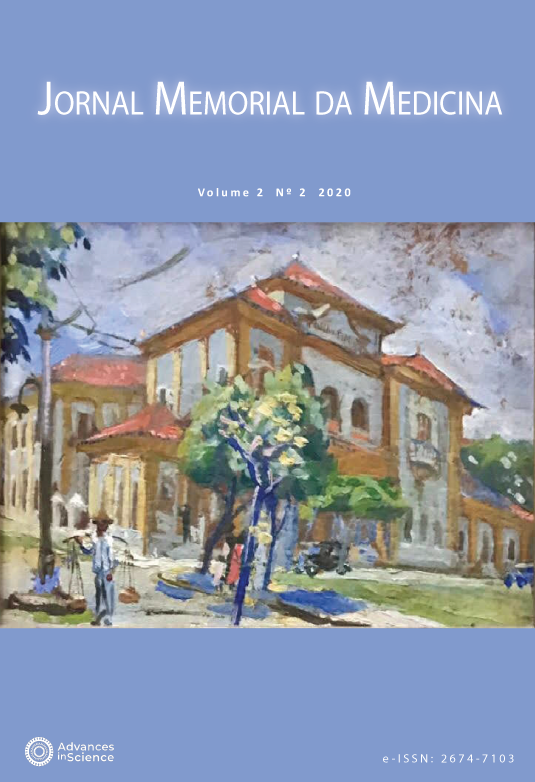Understanding the health-disease process and the birth of Social Medicine
DOI:
https://doi.org/10.37085/jmmv2.n2.2020.pp.8-14Palavras-chave:
Health-disease process, Social medicine, Collective healthResumo
Social Medicine was born from the discussion in the 19th century about the health-disease process, being one of the precursors of health promotion, in which it was seen as a technology of the time for the health-disease process of the population. The health-disease process transforms over time, in which it is essential to have a universal thought that understands that the gradients of mortality and morbidity involve socioeconomic classes. The purpose of this review is to revisit the theories that have grounded the definitions of the health-disease process throughout the history of mankind and the contribution of social medicine to the current context of collective health. It is relevant to address that the living and working conditions of the population were directly linked to their health situation, social, cultural, and psychological factors that influence the occurrence of diseases and illnesses. Therefore, promotion, prevention, cure, and rehabilitation were initial measures based on health education and actions used by the State. Moreover, the field of social medicine strongly contributed to improve and implement the model of primary health care (PHC), focused on the community, considering the social determinants of the health situation of the communities, in addition to the individual aspects of each being.
Downloads
Referências
Sigerist HE (1996) Health. In HE Sigerist. Medicine and human welfare. Yale University Press. Reproduced in Journal of Public Health, 17(2).
Ianni AMZ (2019) Saúde Pública e Colonização da Natureza. Physis, 19(4):1029-1050.
Especialização em Saúde da Família. 1st ed. Online: UNASUS. Processo saúde- doença. 2012:4-6. Available from: https://www.unasus.unifesp.br/biblioteca_virtual/esf/2/unidades_conteudos/unidade01/unidade01.pdf
Calaça CE. Capítulos da história social da medicina no Brasil. Hist. cienc. saude-Manguinhos. 2005;12( 2 ): 557-566. Available from: https://doi.org/10.1590/S0104-59702005000200022.
Puttini RF, Pereira JA, Oliveira LR (2010) Modelos explicativos em saúde coletiva: abordagem biopsicossocial e auto-organização. Physis, 20(3):753-767.
Foucault M (1984) O nascimento da Medicina Social. In: Machado R, organizador. Microfísica do poder, 79-98.
Cordeiro H (2004) O Instituto de Medicina Social e a luta pela reforma sanitária: contribuição à história do SUS. Physis, 14(2):343-362.
Buss PM, Pellegrini FA (2007) A Saúde e seus Determinantes Sociais. PHYSIS: Rev. Saúde Coletiva, 17(1):77-93.
Rouquayrol M, Gurgel ZM. Epidemiologia & saúde. (7) Rio de Janeiro: Medbook, 2013.
Scliar Moacyr (2007) História do conceito de saúde. Physis, 17(1):29-41.
Borde E, Hernández-Álvarez M, Porto MFS (2015) Uma análise crítica da abordagem dos Determinantes Sociais da Saúde a partir da medicina social e saúde coletiva latino-americana. Saúde debate, 39(106):841-854.
Osmo A, Schraiber LB (2015) O campo da Saúde Coletiva no Brasil: definições e debates em sua constituição. Saude soc, 24( Suppl 1):205-218.
Malta DC, Santos MAS, Stopa SR, Vieira JEB, Melo EA, Reis AAC (2016) A Cobertura da Estratégia de Saúde da Família (ESF) no Brasil, segundo a Pesquisa Nacional de Saúde, 2013. Ciênc. saúde coletiva, 21( 2 ): 327-338.
Downloads
Publicado
Licença
Os direitos autorais para artigos publicados no Jornal Memorial da Medicina são do autor, com direitos de primeira publicação para a revista. Em virtude de aparecerem nesta revista de acesso público, os artigos são de uso gratuito, com atribuições próprias, em aplicações educacionais e não comerciais. O Jornal Memorial da Medcina permitirá o uso dos trabalhos publicados para fins não comerciais, incluindo direito de enviar o trabalho para bases de dados de acesso público. Os artigos publicados são de total e exclusiva responsabilidade dos autores. Há encargos para submissão no processamento de artigos (Articles Processing Charge - APC).







